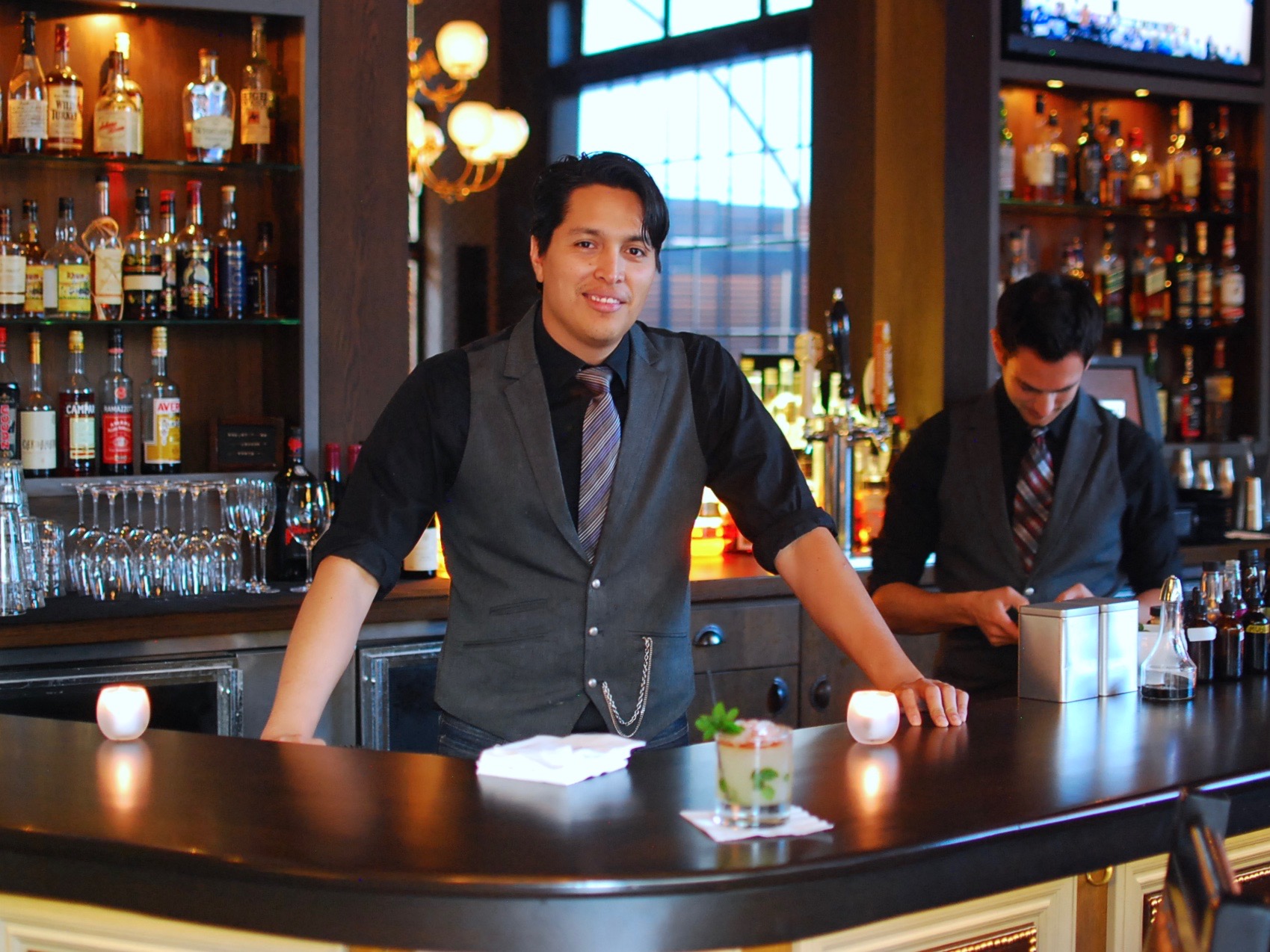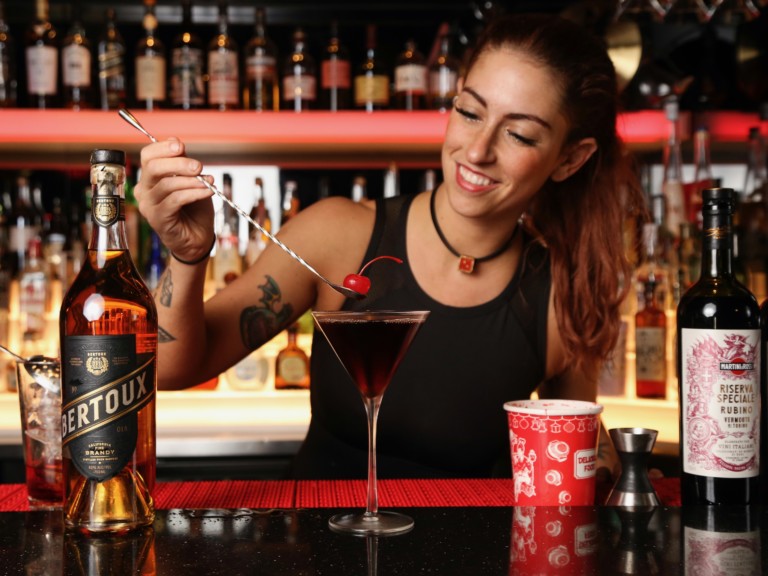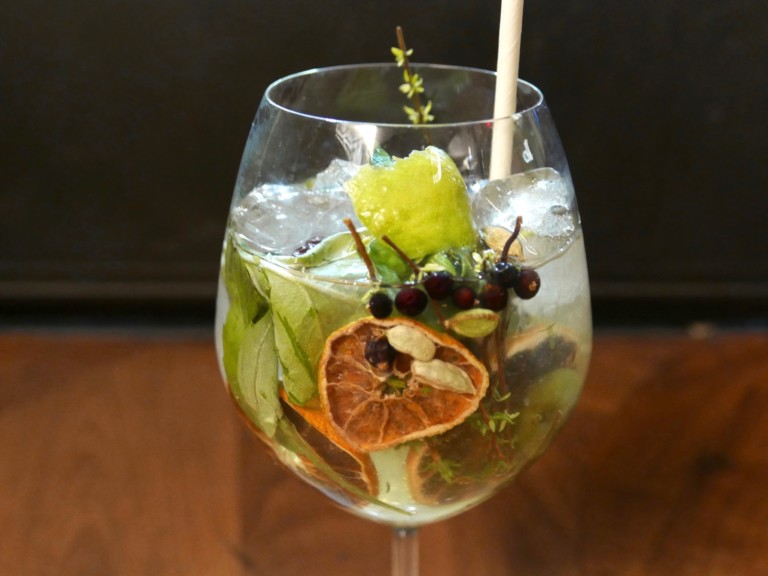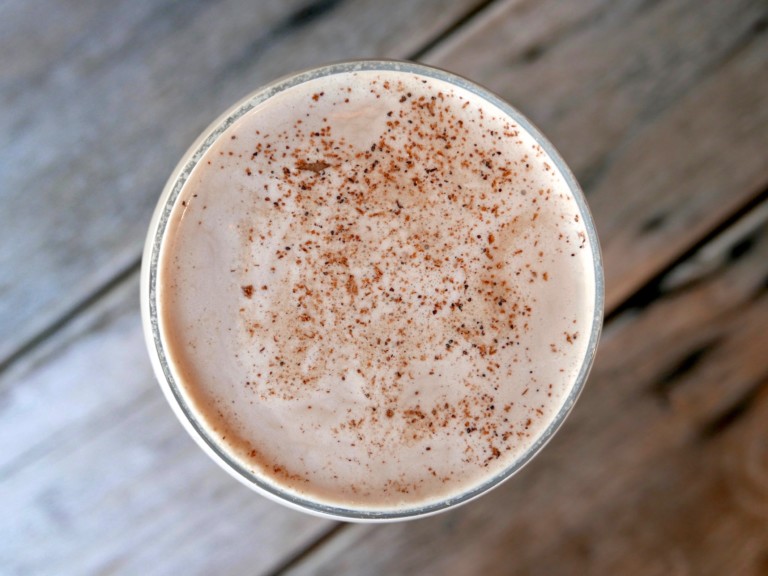A lot of bartenders begin in bars, lounges or restaurants before graduating to coveted travel-filled roles as brand ambassadors. Giovanni Martinez started in reverse. The South Central native grew up in suburban Downey and started working with cocktails and spirits as a brand ambassador for Pernod Ricard, spending eight months on the road at a time, representing brands like Chivas Regal, Gienlivet, Beefeater and Plymouth. He was inspired to settle down with the opening of Seven Grand, which convinced him that Los Angeles might be able to pull off the kind of bar programs that impressed him in cities like London. He worked for venues like The Buffalo Club, consulted for Fig & Olive, and ran a bartending school before taking the reins at Sadie in Hollywood. We visited Martinez at Sadie on March 13 and he shared several spirited insights.
Was it a given that you’d work with cocktails and spirits for a living, or did you consider other careers?
I’ve had every job under the sun between age 16 and now. When I was in college, I was studying anthropology and international relations, and the international relations thing gets you thinking about how we’re all going to meet some fiery, hellish doom at the hands of some megamaniacal rich guys. I went about my life, me and my girlfriend started traveling and I started to pick up the bug a bit. I went to London in the ’90s when they had a scene before anybody in America had a scene. That’s when I first started drinking, and then I came back and there was nothing, it was like, “Why is there nothing like this here?” It was too hard. Then I got a job in the business, traveling. I did this two-year contract. It was a global brand ambassador gig.
For which brand?
For Pernod Ricard, mostly Chivas Regal, but every once in awhile you’d do something for Gienlivet, something or other, or Beefeater or Plymouth. When I got back, Seven Grand was open. I was like, “Oh my god. It’s starting, and it’s starting right here.” It was kind of exciting. I decided to stay and see what I could do within the community.
After your brand ambassador job, where did you go to work?
I started working with a good friend of mine who did a lot of events. He used to do events for Conde Nast, everybody, these big, giant events. And he always needed someone…I didn’t find a bar for years, because that work was lucrative and there was lots of it…That was fun and it teaches you a lot. There’s nothing better than having one day to prepare for 2000 people all at once, nothing like having to batch up 60 gallons of cocktails at a time. After that, I went over to Buffalo Club in Santa Monica, which I really enjoyed because of a lot of history, and it’s such a great, classic bar…The first thing I asked when I showed up was, “Why in the hell are you serving vodka Red Bull? There’s this beautiful, beautiful dining room. Look at the food. No. You guys are shooting yourselves in the foot.” It took awhile. It took me at least five to six months before the majority of drinks being ordered were ordered off the menu. At first I couldn’t pry vodka sodas out of their cold dead hands, if I dared try. Slowly but surely, I started to see a change. Business started to pick up a bit. It was fun.
You talked about that pivotal trip to London, but do you have a first cocktail memory?
My buddy Max was making, I think it was a Seelbach. I remember watching him make it. I didn’t even like it that much. I still don’t like Seelbachs that much. Watching his technique, “This guy really cares about what he does. It matters.” If I was going to do anything, it was going to be doing something I enjoyed. There’s no point in doing it if you don’t. Right before I left, I actually had a job in sales. I was making tons of money, but every day I woke up, I was trying to figure out how to call in sick because I hated every second of it.
What were you selling?
I was working for AT&T. I was sitting at a call center, and people called me to try and get a cellphone or something. You made tons of money, but I hated every second of it. Here, even at the Buffalo Club, when I first started, it was dead and I wasn’t making any money, but I loved every second of it. I loved the chance to educate and try to get some change for the better. I really liked it. Fig & Olive was hard too because they were a very profit driven bar before, where quality had nothing to do with it. When I first got there, I had an impassioned olive oil tasting by the owner, and I saw him yell at somebody for putting the Portuguese Picholine olive oil on a certain dish, when it should have been the Spanish Picholine olive oil. He could taste the difference and it ruined the dish. At the same time, no one there drank spirits. The owner didn’t even drink spirits. They know wine. As far as spirits, “What’s the cheapest booze we can put in the well? What’s the brand people put on the billboard?”
Did you point that out to them?
I did. I said, “You guys are dropping the ball at the first step.” The very first step a diner gets is drinking, and if they look at the list and just think you’re an amateur, that kind of sets the stage…It’s hard to steer a giant ship like that, four restaurants in New York, one here, soon to be another, soon to be another, so baby steps. They’re on their way.
Would you say you’ve had any mentors over the years?
Colin Appiah and Max Warner. They’re going to feel really old for me calling them mentors. They’re not that much older than me, but they’re two London guys I made friends with when I was working with the brand, and they taught me a lot about mixology, a lot about being a bartender. I think the most important thing they taught me was not to lose sight of the fact that we’re bartenders first. For a second there, there was this movement where we were all pricks behind the bar and creating an art form. If you didn’t like it, you were a moron. Get out of my bar. Since they’d already gone past that stage, their cocktail scene has been around for a longer time, they did really good at always telling me, “We’re here for them.” We serve them a glass of water like it’s going to be the greatest glass of water ever. It doesn’t matter what we want. We’re here to serve them. And if we can help someone find something they’d love more than what they’ve been drinking for the past 20 years, that’s good. And if they want what they’ve loved fro the past 20 years, we’re not here to judge. We’re not here to denigrate. We’re here to elevate.
What does a cocktail have to be if it goes on your menu at Sadie?
INTERVIEW CONTINUED ON THE NEXT PAGE









Leave a Comment